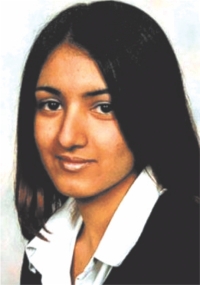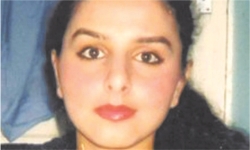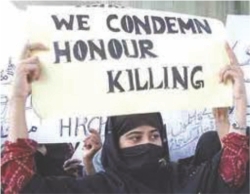| Home - Back Issues - The Team - Contact Us |
 |
| Volume 11 |Issue 08| February 24, 2012 | |
|
|
Straight Talk When there is no Honour Nadia Kabir Barb
I wonder what my life would have been like if I had been mentally or physically tortured by my own family or regularly abused by my husband. How would I have dealt with a situation where I had no one to turn to, no friends to help me in my hour of need, nor anyone to rescue me from my continuous ordeal? I don't think I can actually answer that question and thankfully I don't have to but for countless women this is not a hypothetical question that can be pondered over in the safety and comfort of their own homes but a harsh reality, one that they have to live with day in and day out. In 2006, Banaz Mahmod, a twenty-year-old young woman of Kurdish descent was strangled to death in Birmingham where she lived and her body stashed in a suitcase and buried. The tragedy is that her own father and uncle ordered that she should be put to death and her memory erased from the family as she had brought shame to them by leaving her abusive husband and then having a boyfriend. Her murder was carried out by her two cousins and these two men also conspired to kidnap and kill her boyfriend but he managed to escape by fleeing the country. It was later known that Banaz had filed a complaint with the police stating that her life was in danger but sadly they failed to intervene until it was too late. A fifteen-year-old girl Tulay Goren, from North London, was also killed in 1999 by her family for running away from home to live with her boyfriend. They disapproved of her boyfriend as he was almost twice her age and because he was from a different branch of Islam. Her father was jailed for life with a minimum sentence of 22 years in 2009 for murdering his daughter after kidnapping, drugging and tying her up. Tragically her remains, which police believe were briefly buried in the family garden and then dug up and disposed of, have never been recovered.
I also recall a story I read about a twenty-seven-year old Sikh woman Surjit Athwal, who worked at Heathrow Airport as a customs officer. She disappeared after going to a family wedding in Punjab, India in 1998. In this particular case it was her mother-in-law who ordered Surjit's death at a family meeting after discovering that her daughter-in-law, had been having an affair and wanted a divorce from her son. Both mother and son were found guilty of killing her and subsequently sent to prison. These crimes are considered 'honour killings' but how can any murder be considered honourable especially ones that are so barbaric in nature. I would have to agree with Shahien Taj, from a registered charity the Henna Foundation that deals with the marginalised section of the Muslim community, namely women and children. She stated that: "Honour is supposed to be a positive word. Clearly, calling a killing an 'honour crime' is a contradiction of terms.” We are also not talking about remote villages in India, Bangladesh, Pakistan, Afghanistan or anywhere else but in bustling metropolises such as Birmingham and London. In the last decade or so, there has been a sudden increase in the number or of women activists emerging in the form of charities dealing with women's' rights and one of these organisations that I recently came across was the New Muslim Suffragettes (NMS) in the UK. These are women who put their own lives at risk to try and offer support and in many instances sanctuary for vulnerable and marginalised women. 'The NMS provide refuge, advocacy and access to the British legal and welfare system for women whose daily lives consist of beatings, imprisonment, torture and even marital rape, as well as the mental health ramifications that unfold over time.' However, in trying to help these women, the members of the NMS who themselves are wives and mothers have found they are often under attack in the form of persecution, intimidation and even have death threats made against them. They are perceived by extremist Muslims as being westernised, modern and anti Islamic and many of the families (especially those perpetrating these crimes) feel that the organisation is there to shame and dishonour the Muslim community. It is ironic that they do not see that they are the ones that are a disgrace to their own community and the society in which they live. One NMS member received a phone call where the man on the other end of the line told her he knew where she lived and threatened to chop her legs off for taking his daughter away from him. She also received a threat that her car was going to be bombed for rescuing a young woman from a forced marriage and domestic violence. Another New Muslim Suffragette was told that she would have her throat slashed. There are also other organisations similar to the NMS such as the counter-extremist and gender equality consultancy 'Inspire', the 'Henna Foundation' and Iranian and Kurdish Women's Rights Organisation (IKWRO). All of these charities face the same type of prejudice directed against them and they too are constantly harassed and threats of violence are made against them and their families. It takes a huge amount of courage and a great deal of conviction to keep helping these marginalised and abused women especially when they themselves are targets of hatred and violence. There are numerous Muslim scholars and Imams who have shown their support and I can only hope that organisations such as the New Muslim Suffragettes find even more support and assistance from the Muslim community and also the wider general public to allow them to do their job without fearing for their lives. Copyright
(R) thedailystar.net 2012 |


